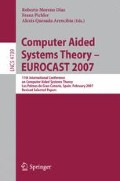Abstract
Fuzzy logic breaks logic equivalence of statements such as (A∧B)∨(¬A∧B)∨(A∧ ¬B) and A∨B. It breaks the symmetry of use of such logically equivalent statements. There is a controversy about this property. It is called a paradox (Elkan’s paradox) and interpreted as a logical weakness of fuzzy logic. In the opposite view, it is not a paradox but a fundamental postulate of fuzzy logic and one of the sources of its success in applications. There is no explanatory model to resolve this controversy. This paper provides such a model using a vector/matrix logic of rational and irrational agents that covers scalar classical and fuzzy logics. It is shown that the classical logic models rational agents, while fuzzy logic can model irrational agents. Rational agents do not break logic equivalence in contrast with irrational agents. We resolve the paradox by showing that the classical and fuzzy logics have different domains of rational and irrational agents.
Access this chapter
Tax calculation will be finalised at checkout
Purchases are for personal use only
Preview
Unable to display preview. Download preview PDF.
References
Resconi, G., Klir, G., St. Clair, U.: Hierarchical uncertainty metatheory based upon modal logic. Int. J. of General Systems 21, 23–50 (1992)
Resconi, G., Türkşen, I.B.: Canonical forms of fuzzy truthoods by meta-theory based upon modal logic. Information Sciences 131, 157–194 (2001)
Resconi, G., Kovalerchuk, B.: The Logic of Uncertainty with irrational Agents. JCIS (2006)
Resconi, G.: Agents and Lattice, ISKE (2006)
Resconi, G., Türkşen, I.B.: Truthoods based on an Additive Semantic Measure with Break of Global Symmetry in model Logic. IJF (2006)
Elkan, C.: The Paradoxical Success of Fuzzy Logic. IEEE Expert with fifteen responses 3(8), 9–46 (1994)
Elkan, C.: The Paradoxical Controversy over Fuzzy Logic. IEEE Expert, 47–49 (1994)
Resconi, G., Jain, L.C.: Intelligent Agents, Theory and Applications. In: Studies in Fuzziness and Soft Computing, vol. 155, Springer, Heidelberg (2004)
Westphal, J., Hardy, J.: Logic as a Vector System. Journal of Logic and Computation 15(5), 751–765 (2005)
Gaines, B.R.: Fuzzy reasoning and the logics of uncertainty, Multiple-Valued Logic. In: Proceedings of the sixth international symposium on Multiple-valued logic, Logan, Utah, pp. 179–188 (1976)
Kovalerchuk, B.: Analysis of Gaines’s logic of uncertainty. In: Turksen, I.V. (ed.) A Quarter Century of Fuzziness, Approximate Reasoning and Knowledge Engineering. In: Proc. of NAFIPS 1990 conference, Toronto, vol. 2, pp. 293–295 (1990)
Kovalerchuk, B., Resconi, R.: Break of Logic Symmetry by Self-conflicting Agents: Descriptive vs. Prescriptive Rules. In: IEEE Intern. Conference on Integration of Knowledge Intensive Multi-Agent Systems, KIMAS 2007, Boston, pp. 348–353 (2007)
Entemann, C.: Fuzzy Logic: Misconceptions and Clarifications. Artificial Intelligence Review 17(1), 65–84 (2002)
Pelletier, F.J.: On Some Alleged Misconceptions about Fuzzy Logic. Artificial Intelligence Review 22(1), 71–82 (2004)
Author information
Authors and Affiliations
Editor information
Rights and permissions
Copyright information
© 2007 Springer-Verlag Berlin Heidelberg
About this paper
Cite this paper
Resconi, G., Kovalerchuk, B. (2007). Explanatory Model for the Break of Logic Equivalence by Irrational Agents in Elkan’s Paradox. In: Moreno Díaz, R., Pichler, F., Quesada Arencibia, A. (eds) Computer Aided Systems Theory – EUROCAST 2007. EUROCAST 2007. Lecture Notes in Computer Science, vol 4739. Springer, Berlin, Heidelberg. https://doi.org/10.1007/978-3-540-75867-9_4
Download citation
DOI: https://doi.org/10.1007/978-3-540-75867-9_4
Publisher Name: Springer, Berlin, Heidelberg
Print ISBN: 978-3-540-75866-2
Online ISBN: 978-3-540-75867-9
eBook Packages: Computer ScienceComputer Science (R0)

